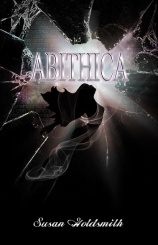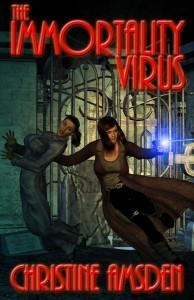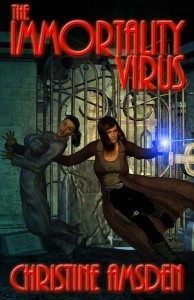Christine Amsden's Blog: Christine Amsden Author Blog, page 57
March 14, 2011
Tips for Writers: A Grain of Salt
[image error]Hungry young writers often snap up writing advice as if they were starving, internalizing it and making it part of a core truth. It is tempting. We spend most of our lives accepting the word of authority figures, beginning with parents and teachers. I sometimes wonder what I believe without question that is exactly wrong.
But it's a bit overwhelming to talk about everything, so let's just talk about writing advice, something I know a little about. I love to read the advice of authors who have been there before me, and in fact, I had a lot of success taking advice from Orson Scott Card at a boot camp in 2003. The things he said really helped me take my writing to the next level.
Yet today, I know something else: Take all writing advice with a grain of salt.
In an effort to follow my own advice, I decided to look up the origin of the above saying. Wikipedia had some interesting history regarding poisons and antidotes, but here's what interested me: The Latin word salis means both salt and wit. So, I could just as easily say:
Take all writing advice with a grain of wit.
Us writers love to give advice. It's probably just an aspect of human nature, because most people like to share wisdom, especially as it pertains to the things they have mastered. So you take a newbie, throw him together with his favorite author, and watch him take everything the author says as the gospel truth.
Here's the truth: The only writing advice I can give you is what works for me.
When it comes to making use of feedback, perhaps you've heard the typical advice: Pay careful attention to the things many agree upon, and the things that resonate with you.
The same is true in taking any writing advice. If you want to be a writer, then you can't be a vacant receptacle for cosmic wisdom. There are no formulas or easy answers. Creativity comes from within, which means you have to apply your own self, your own reflections, your own intelligence, and your own wit. Don't take everything you hear or read about writing too seriously, because there are no universal truths or rules when it comes to art. Those who would suggest otherwise are missing the point.
That's not to say don't read writing advice, ignoring the collective wisdom of those who have been there before you. I'm just saying you should think about it, and apply those critical thinking tools they try to teach you in school. Ask, not just what, but why? Why does this work? When might it not work? Does this author make effective use of the tool?
The creative process is largely psychological, and we're not all the same. You can observe this by watching some of the great debates out there: pansters vs. outliners, music vs. quiet, or cursing: yay or nay?
I mention this in part because it's something you need to hear and understand, and in part because I'm wanting to start sharing some ideas that I readily acknowledge won't work for everyone. But they work for me, and whether you agree or not¸they may help you gain insights into your own writing.
Share and Enjoy:
March 9, 2011
Book Review: Abithica
 What if you were some kind of disembodied spirit, moving from host to host, living life through other people's bodies, but never having a life of your own? What if you didn't know what you truly are, let alone who you are? Could you find happiness or love?
What if you were some kind of disembodied spirit, moving from host to host, living life through other people's bodies, but never having a life of your own? What if you didn't know what you truly are, let alone who you are? Could you find happiness or love?
A minute ago, she was Claire, who just fell back in love with her husband, Tom, but before she left, she broke her number one rule – she got attached. Now she's Sydney, a troubled young woman who got involved with a dangerous gang that won't let her leave – at least, not alive. Sydney's spirit is so broken that she takes a backseat to her body's new spirit inhabitant, offering no help or even information.
Alone in a strange body, cast adrift with only her own wits and insecurities, a nameless spirit once again breaks all her own rules. She falls in love, knowing that any second, and without warning, she may end up in another body – either part of God's plan or some cruel joke. She's pretty sure she's there to help Sydney, but why oh why can't she have a little something for herself?
Abithica's selflessness and hopeless longing stole my heart. She took me on an emotional journey through hope, despair, horror, and love.
The fantasy elements strengthened and intensified the love story, creating a magical blending of genres. I highly recommend this book to lovers of fantasy and romance.
Rating: 5/5
Title: Abithica
Author: Susan Goldsmith
Author web site: http://www.susangoldsmithbooks.com/
Publisher: Twilight Times Books
url: http://twilighttimesbooks.com/
ISBN: 978-1-60619-235-1
Genre: Urban Fantasy
Format: trade paperback
Release date: June 15, 2011
Price: $16.95
Size: 5.5 x 8.5
Pages: 250
Share and Enjoy:
March 8, 2011
Why I Don't Own an EReader
I've been pushing read an eBook week for a variety of reasons, not the least of which is that my own titles are available in electronic format (as well as print). I think eBooks have a lot to recommend them — they are cheap to produce and distribute, and they have the potential to allow even blind people like me to read an enlarged version of a book.
I think eBooks are the future of publishing. It's something I have said before, and something I stand by, but the transition to a paperless format is currently in the midst of growing pains. Larger publishing houses, in particular, are selling electronic books for almost the same price as a paperback or hardback, and in some cases, even more. I don't pretend to understand the rationale that goes into their marketing decisions, but human nature suggests that in the midst of a transition that will change the face of publishing, people are nervous. Since eBooks allow smaller publishing houses to produce quality work cheaply, some may wonder what the role of the major publisher will be in the future?
None of which is actually why I don't own an eBook reader. Because the truth is, even though many new titles are expensive to purchase via eBook, there are also many free books (especially classics, for which the copyright has expired), inexpensive books (especially older titles), and reasonably priced books (especially through small to medium-sized publishers, like Twilight Times Books).
The reason I don't own an eReader is that despite the potential for the technology to allow me to increase the font size to suit my needs, it doesn't. Most books allow some enlargement, but I have yet to see any allow me to blow up the text larger than your average large print book. (Which, unfortunately, I cannot read without extra magnification.)
I do sometimes read eBooks on my computer, especially when a title I'm interested in is not available in audio format. It is easier for me to curl up in front of my word processor, with the text blown up to 26-36 point font (depending upon the day), than it is for me to struggle with magnification (which is no longer sufficient for me in the case of a standard paperback). Is it annoying? Of course! I totally get why many of you have no desire to curl up with a good computer, and why eReaders are a good choice for you, but for my part, I'm still waiting for the technology to catch up with its simple potential.
If you're curious about my visual difficulties, check out my article, Being Blind. It needs some updating, because my visual acuity has slipped a notch in the years since I wrote that. I now prefer 36-pt font most days.
Share and Enjoy:
March 7, 2011
Read Chapter One of The Immortality Virus
 Chapter one of The Immortality Virus is now up on my web site in a blatant attempt to get you hooked so you'll want to buy it when it comes out in June. Enjoy!
Chapter one of The Immortality Virus is now up on my web site in a blatant attempt to get you hooked so you'll want to buy it when it comes out in June. Enjoy!
Share and Enjoy:
March 6, 2011
Read an eBook Week
Twilight Times Books is giving away FREE books all week in honor of read an eBook week. One of these books is "How I Wrote My First Book: The Story Behind the Story," which contains an article I wrote: My Million Words of Crap. This book will be free all week. Also, each day select Twilight Times titles will be available for free download. To get your free books, click here.
Touch of Fate is not going to be free this week, however, it is half off at OmniLit, so if you haven't read it yet, you can get the eBook version there for $2.75 this week.
Today's free title is Behold the Eyes of Light by Geoff Geauterre. I haven't read it yet, but I have downloaded it and plan to enjoy it this week, along with the other free downloads. I'll be reviewing them over the next few weeks.
Share and Enjoy:
March 3, 2011
The Immortality Virus Update
We've got cover art, we've got a back cover, we've got an edited manuscript, and it's about to go to the printer. I'll probably have ARCs (advanced review copies) in a couple of weeks.
The book itself is still scheduled for release in June of 2011, so for the next few months, I will probably have more frequent updates.
Share and Enjoy:
March 2, 2011
Cover Art In
February 23, 2011
How I wrote My First Book
Before I wrote my first book, I had to write at least a million words of crap. Writing a book isn't a single experience, it's a journey comprising not only writing lessons, but life lessons. I describe my personal journey in detail in "My Million Words of Crap," one of the articles available in a new eBook called How I Wrote My First Book.
The book is available through various eBook distributors, including amazon (in kindle format). It will also be available FREE through Twilight Times website during read an ebook week, March 6-12. (I'll say more about ebook week in March.)
Share and Enjoy:
February 18, 2011
Book Review: Darkfever
Urban fantasy at its best.
If you can get past the cover art, which makes the book look deceptively like the type of romance novel people are embarrassed to read (at least in public), what you'll find is the story of a naive young southern girl whose illusions about the world are suddenly shattered when her older sister is murdered on the streets of Dublin.
When the police file her sister's case away to the unsolved department, Mack flies to Ireland to strong arm the police into reopening the case. But living in a rural southern town all her life didn't prepare her for the things walking around the streets of Dublin — the things that only she and a handful of others can see. If she had known about them all her life, she might have known better than to stare, she might have realized she should pretend not to see them, so they would have no reason to hunt her. But she hadn't known. And she ends up thrust into a world she isn't prepared for, finding dubious allies with their own deadly agendas.
There are five books in this series, and they're all available, so if you like to read books back to back, this is a good one to start. I'll write a series review as soon as I read the last book (on order at the library), but for now, I highly recommend this to those who enjoy urban fantasy.
5/5 stars
Title: Darkfever
Author: Karen Marie Moning
Share and Enjoy:
February 14, 2011
Writing Tips: That Which Brings Them Together
In the genre of romantic fantasy, I will accept that spark of lust that occurs when two people notice one another for the first time, and the physical desire that underlies each new encounter. Heck, chemistry is important. I will even accept those things when they seem a bit larger than life, exaggerated for the sake of the dream.
But that can't be all there is.
There are two problems with the lust/love equivalence. The first is a matter of disbelief on my part, because a person can feel chemistry with any number of people. I am particularly likely to roll my eyes when a woman in her mid-to-late-twenties suggests that she's never felt anything like it before. Seriously? Have you never met a male of the species before? You never had a schoolgirl crush? Did you skip puberty?
And then of course, there's the rakish man who has met his physical needs with any number of women, but this woman…well, she's different. What makes her different? What makes her special?
The second problem is something I will call forcing reality to suit your desires. When nothing supports the attraction begun by that initial spark, when that's all there is, one has to wonder what's going to happen after the HEA, when the characters wake up from their respective dream worlds.
Love is not a force of nature beyond our control. It is built upon a number of things, including chemistry, but also shared interests, shared goals, similar morals, and most of all — loving actions. I like to think of love as a verb, rather than a noun.
So when writing a romance, or even a romantic subplot, ask yourself: What brings these two together? And what will keep them together well into their happily ever after?
Share and Enjoy:
Christine Amsden Author Blog
- Christine Amsden's profile
- 422 followers




